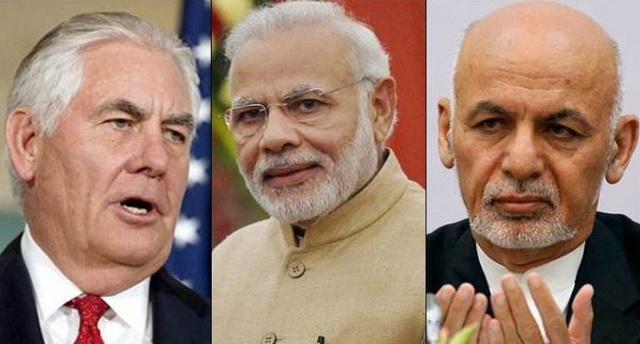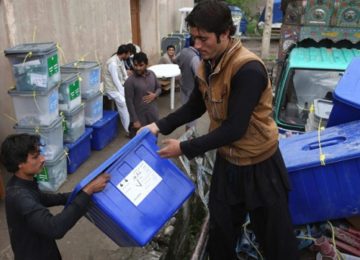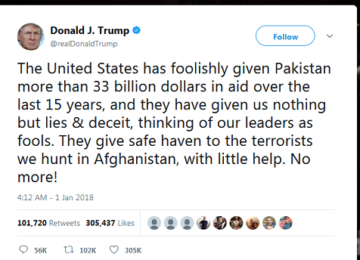Pakistan’s strategic position in the region is being squeezed in an elegant symphony of coordination between the spies and generals that run US foreign policy, the Narendra Modi establishment in New Delhi, and Ashraf Ghani in Kabul.
After the US Secretary of State Rex Tillerson’s tour of South Asia Indian strategists will wake up in the morning with a positive spring in their step. The regional strategic balance has dramatically been in India’s favour over the last two years, and if President Trump’s Afghanistan strategy speech was some sort of a signal for this shift, Tillerson’s trip to New Delhi – via Bagram and Islamabad – was the veritable arrival of the caped crusader himself, good old Batman. The United States, for decades, has had to manage its interventions and relationships in the region with varying degrees of proximity and alignment with Afghanistan, Pakistan and India. Its strategic interests pivot in the region has been Pakistan, upon whom the US has lavished praise at times, for Pakistan’s remarkable military and intelligence capabilities, as well as criticised Islamabad, at other times, for expectations that were unmet.
Interestingly, India has traditionally been a hesitant client of the Americans. Nehruvian values and a romance with the USSR may have informed the relationship prior to the turn of the century, but as recently as 2012, Indian leaders were wary of aligning too closely with the US. The Narendra Modi era has seen a steady rise in the appetite of both countries to engage in explicit and multi-front strategic partnerships. Afghanistan has been too much of a question mark to ever truly pin down. The wily and former Afghan president Hamid Karzai’s most Afghan trait was his ability to keep friends and enemies guessing – but the downside of his extensive experience in managing a multipolar Kabul was the inability of a coherent and consistent narrative that went beyond complaining about the erstwhile US ambassador Peter Galbraith and former Pakistani president and army chief Pervez Musharraf. Ashraf Ghani, since 2014, has established a clear position for his country – Afghanistan is open for business, including to Pakistan, but transit trade is a two-way street.
Ashraf Ghani’s two-way street wanted is the one that allows trucks laden with Indian goods to drive through Pakistan and enter Afghan territory unmolested. Because of the dysfunctional Pakistan – India relationship, this route has been victim to the same stupidity that keeps ‘Shaan’ karhai masala from reaching Madras grocery stores, and ‘Haldiram sohan papdi’ from shelves in Gujranwala. When Ghani was on a Pakistan-charming offensive, since the time he took oath as president to the moment the Murree talks between the Afghan government and Taliban representatives were sabotaged, trade relations were a pivotal element of his representations to the Pakistani government. His consistency on the issue is a matter of record, and he has not hesitated to talk boldly to senior Pakistani government officials about the issue.
Tillerson’s tour allowed a staging ground for Ghani, who publicly and unambiguously defined a maximalist position on regional trade: if Pakistan won’t let Indian goods ply on Pakistani roads for Kabul, Afghanistan will not allow Pakistani goods to ply on Afghan roads for Central Asia and beyond. If thus far, Ghani’s provocative bluntness has been akin to poking the Pakistani bear, this maximalist position is akin to stabbing the bear in the chest. The anger in Pakistan is palpable. At the beginning of October, Pakistani army chief General Qamar Bajwa had visited Kabul and the talks between him and the It was thus assumed that Ghani had returned to his senses and was going to resume being conciliatory toward Pakistan.
But the Quadrilateral Coordination Group meetings in Muscat between Pakistan, Afghanistan, China and the United States do not seem to have gone very well. Whilst Indian National Security Adviser Ajit Doval flew to Kabul on the eve of the Muscat meetings, ostensibly to make a show of the continued bond between Kabul and Delhi, the fragility of Pakistan’s relations with both the US and Afghanistan was once again rearing its ugly head. No sooner had Pakistani commentators (including this one) finished celebrating the renewal of meaningful cooperation between US and Pakistani intelligence as was reported in the Caitlin-Boyle abductee rescue case, did the CIA began raining on the parade. Add it all together, and the outside world has continued to pile up a substantial amount of pressure on Pakistan. The messages are multifaceted but crystal clear: asphyxiate the operational capacity of the LeT/JuD, the JeM and especially the Haqqani Network. Make them stop attacking India and Afghanistan. Period.
President Ghani’s invocation of the trade route between India and Afghanistan via Pakistani territory is external to that, but not unrelated. In fact, it has been an open window of opportunity that Pakistan has failed to take advantage of. As always, Pakistan is not only victim of a history of bad decisions, but also of circumstance and geography. If Pakistani leaders were to open the trade route now, it would seem not to be a concession, but a submission. Pakistan is not going to submit to ultimatums from Ashraf Ghani, even if such a submission is the optimal thing to do. Before Rex Tillerson deplaned in Bagram, there was some space for arbitrage. Pakistan and the United States could continue to try to make a dysfunctional relationship work, whilst helping the reconciliation process in Afghanistan along. All the while, Pakistan and India could continue to pretend that the other has no place in the region, and make noise at each other when the cameras were on.
Recent regional visit of Tillerson might disabuse us of some of these notions. Pakistan’s strategic position in the region is being squeezed in an elegant symphony of coordination between the spies and generals that run US foreign policy, the Narendra Modi establishment in New Delhi, and Ashraf Ghani. If a China-centric posture was a strategic luxury for Pakistan before, the Trump strategy for South Asia will force it to become a strategic imperative now. The more Pakistani strategists are forced to depend on China, the less they will feel compelled to please the United States, Narendra Modi and Ashraf Ghani. Indeed, that is where Indian strategists have always wished to Pakistan. But complacency in this regard would be foolhardy. Pakistan’s path to where it finds itself today is adorned with F-16s and strategic partnership with the United States. Indians may think of Rex Tillerson as Batman. But what if Batman is actually working for The Joker?
Mosharraf Zaidi is a well-known Pakistani columnist and development practitioner and was a former advisor to the Pakistan ministry of foreign affairs. He tweets @mosharrafzaidi
Source: Indian Express








